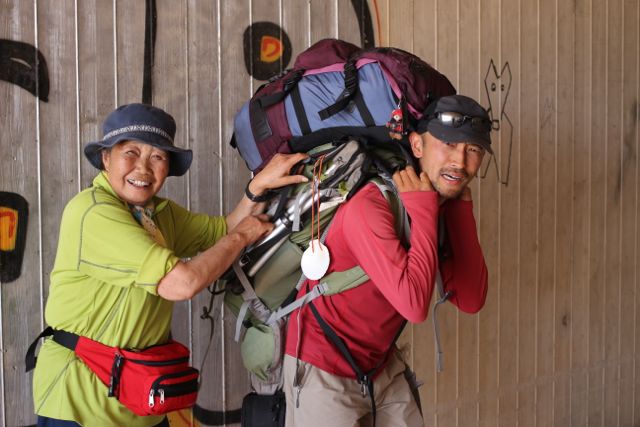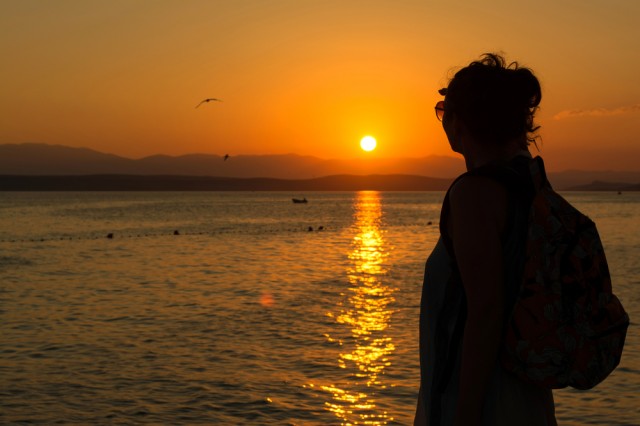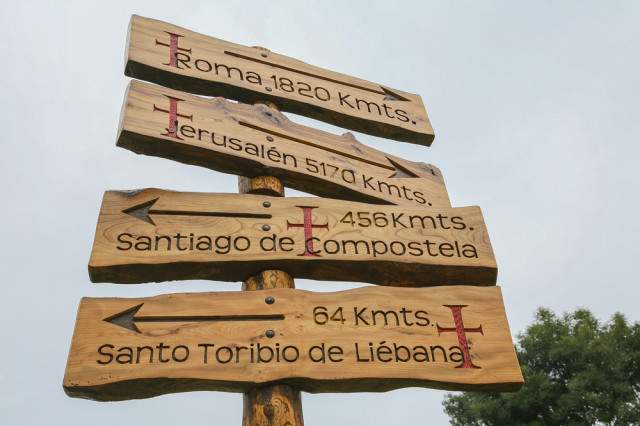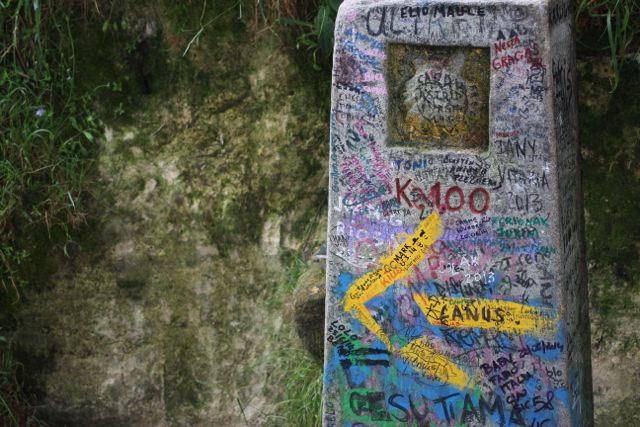It is impossible to walk 800 kilometers without learning a few things. One cannot wake with first rays of the sun and watch the world stir to life, measuring time by the rhythmic crunch of gravel beneath boots and the click of the brass tip of a hand-hewn walking stick on stone, without observing more than the fields, the flowers, and the pictures painted as the clouds change color. It is impossible to walk through the lives of hundreds of strangers and not find, in at least a few of them, a teacher, a mentor, a sage.
As the sun beats down and a pack gets heavy, as boots wear on sore places and sweat drips off of a nose, or an elbow, as water dwindles and the silence becomes deafening, we turn inward, to an entirely different landscape, and find that there are lessons to be learned there as well.
It’s been almost three months since I set down my pack in front of the grand cathedral in Santiago de Compostela and took off my boots. It marked the end of one journey, but really, was only a way marker in my much longer one.
I thought about a lot of things while I walked
From where I might find lunch that day, to where I wanted to take the next phase of my life, to whether I’d remembered to organize my son’s physics class for the coming school year, and whether we could get “our” house back in Guatemala for the winter, to what the Spanish word for “tape” was, and how I managed to get to forty years old without really noticing.
There is an amazing amount of brain space to be found in 38 days of nothing but putting one foot in front of the other.
I thought about my children and my friendships. I thought about my marriage and what love means. I thought about aliens, and past lives, kirtan music, the institution of the church, the Wizard of Oz, the GMO conundrum, why some of us are “lucky” and others are not.
I thought about what a genius DaVinci really was, the amazing infrastructure of the Roman Empire, and why, oh WHY white asparagus and tuna comes to top every single salad one orders in Spain. Why?
There is an amazing amount of brain space to be found in 38 days of nothing but putting one foot in front of the other. I thought about a lot of useless stuff, just like I covered many monotonous miles for the handful of mountaintops that took my breath way.
Woven through the hours and days of space within my own head are a few lessons, a few thoughts, a few rays of light that, together, illuminate my path forward.
1. What you carry is your business… so is what you put down

Physically, literally, figuratively, it doesn’t matter. It’s all true. All of those packing lists of what you need and don’t need for your journey as well as the myriad of self help lists of how we should or shouldn’t approach life, my instinct is to say that they’re bunk. Instead, I’ll say that they’re of limited value. Other people’s experiences might serve to inform our own, to help us to make more efficient progress, to avoid making an obvious mistake, but at the end of the day, we each have to do what suits us.
Pierpaulo was laughed at for carrying three pairs of Italian shoes and a bathrobe in his pack. John off loaded just about everything but one t-shirt and a bar of soap by the end of the second week. Jade left most of her health kit, as dead weight, two days before she got sick. Anna’s pack looked huge on her tiny frame, but that wasn’t the heaviest thing she was carrying. Some people appeared to be carrying very little but were really shipping copious baggage forward each day.
Of course it’s not the actual items that are left, those are just symbols of the heavier things: the loves, the losses, the heartbreaks, the frustrations, the disappointments and failures, the worries and disillusionments that we’ve all packed along for the ride.
You can’t judge a pilgrim by his pack. Carry what you want. Carry it your way. Don’t carry it at all. Nobody else gets a vote.
The road to Santiago is littered with things that people put down. Swap tables in Albergues full of clothes and gear, books and food items. Shoes left like offerings to the gods on top of stones and at the feet of statues. Photographs. Letters. Talismans. Icons. Stones with names written on them. Candles. Flowers.
Of course it’s not the actual items that are left, those are just symbols of the heavier things: the loves, the losses, the heartbreaks, the frustrations, the disappointments and failures, the worries and disillusionments that we’ve all packed along for the ride. Sometimes we choose to keep carrying those things, on purpose, with intention. And then, one day, we wake up in a stone village in the middle of nowhere with Gregorian chant ringing in our ears, and it becomes completely obvious that it’s time to set it all down, every last thing.
What we carry, or what we put down, that’s our business, no one else’s. Carry what you like, carry what you must, carry what you need to honor. Put down what is heavy, put down what you’ve enshrined, put down what binds you. For you. By yourself. Your way. In your time.
2. All that matters is that we keep going

The only failure lies in giving up entirely. I met a husband and wife who were making their third attempt at the Camino after sore knees and an injury had sent them home from previous efforts. I’ll bet that when they left the trail both times before it looked like they were giving up, like they’d failed. Maybe they even felt that way themselves. In reality, their Camino was just taking a little longer, and more circuitous route, than some others. It took them several years, but they made it.
I’m far more interested in the story of struggle told by the dude with raw feet who limped into town with a friend under each arm supporting him.
How fast you’re going in this life, how many kilometers you’re ticking off a day, how many mountains you climbed under your own steam, how much training you did ahead of time – none of that matters, bragging rights aside. And really, I’m not interested in having a beer at the end of the day with the guy who can only talk about how much he’s done and how great it feels. I’m far more interested in the story of struggle told by the dude with raw feet who limped into town with a friend under each arm supporting him. He’s earned that beer.
All that matters is that we keep going. Not just physically, in a particular journey from A to B, but in everything. In our lives and relationships, in raising our kids and building our businesses, in nurturing ourselves and personal growth. We might not be moving fast, we might not be winning awards, we might not be impressive in any outward sense, but so long as we are moving forward, we’re getting there. Keep going.
3. There are many roads

I’m amused at how many people I meet who think that I walked the one and only Camino de Santiago. In reality, I walked only a part of one road. Take a look at a map of the Camino de Santiago, and you’ll see that it’s a spiderweb of paths, some that start as far away as Poland. One branch winds through my friend Tanya’s village in Switzerland. I could walk a Camino each summer for the rest of my life and cover very little ground twice.
We walked exactly the same path but entirely different journeys.
There are many Caminos. There are many roads. Not just to Santiago.
Even on the same path there are many Caminos. No two pilgrims walk the same Way, really. I walked with people walking the last adventure of their lives, intentionally. Others were joyfully out on their first. I walked out of Logrono with a man who wept silently for several miles before we parted ways. Tears streamed down his face. His heart felt like a stone, and there was a woman’s name written on it. I carried what I could for him.
No two pilgrims walk the same Way, really.
His path was long and dark and heavy. I hugged him goodbye and I never saw him again. Then, there was the Belgian kid with his guitar who played and sang his way up every mountain, for the benefit of everyone around him. His path was light and beautiful to him, and to those who walked with him. We walked exactly the same path but entirely different journeys.
I’m quite sure that no one, in the history of the world, has had the Camino that I did. We are all on different journeys, even when we share a path.
4. Pain is to be expected

I met no one on the Camino who was not suffering. Those of us who were the lucky ones, could point to our wounds on feet or knees. There were other pains, less obvious, and harder to heal. No journey is without it’s challenges. No adventure comes without pain.
I’m learning that when we anticipate the pain, it’s not such a disruption to life when it arrives. It’s like opening the door to that relative who wears on every last nerve, who you know you’ll have to breathe deeply and maybe drink a little to survive their visit. We all have one.
No journey is without it’s challenges. No adventure comes without pain.
Pain is the same. It comes knocking in this life. Physical, emotional, relational; we shouldn’t be surprised. We shouldn’t be offended. We should just learn to accept the visit, look for the good, make the best of the time, and figure out what we’re supposed to be learning from it: Patience, perseverance, long suffering, compassion, determination.
Whether it’s a foot or an ankle, an inflamed knee joint, a broken heart, a deep sadness, or some other wound that doesn’t show on the surface, these things are common to mankind. Pain is to be expected, perhaps even welcomed for the teacher it is.
5. There are no strangers

I slept the second night in Roncesvalles, in a giant stone chapel filled with bunk beds and a hundred strangers. Or so it seemed, as I lay awake and a little lonely in the cold dark of a sleepless night. In reality, I was surrounded by friends, a few would change my life. Unbeknownst to me, every single person who became important to me in the month I walked was in that room that night, because we’d all begun at about the same time.
Israel, the seventy year old Guatemalan man who became my self-appointed Spanish teacher by the end of the first week, and who proposed, every day for the first 23 days, that after Santiago we sneak away and have a honeymoon together in Finesterra for three days, climbed into a top bunk across the aisle. I remember seeing him and thinking, “I wonder if that old dude needs help up….” He didn’t.
We were strangers, one and all, destined to become family.
Florida, who spilled his life story over a beer that night and with whom we shared many more in the coming weeks was the unprepared, freaked out, overwhelmed hostel newbie who made the mistake of choosing a bunk too near the stinky boot rack. California Dreamin’, a duo who was present the night I arrived in Santiago, were hidden among the bunks. As was Anna, who Jade and I passed in the mist coming over the mountain. The Italian composer was there, so was Isabelle, and the hippie kids, and the two Belgian hikers I didn’t meet until after Leon. Shane was there, so was Kiona, and Carlos, and Orla, and Tiffany, James, and Mimo. We were strangers, one and all, destined to become family.
Three weeks later, in a nameless, faceless town in the middle of the meseta, we slept in another giant bunk room, only this time, with my friends. Kiona made the rounds that night, as we all slithered down into our sleeping bags, and kissed us on the foreheads, wishing us all sweet dreams. That night, no one felt alone.
It doesn’t really matter where we’ve been, or where we’re going. We’re all walking together, all learning, all moving forward.
I’ve long believed this: that there are no strangers. It was my Dad who first pointed it out to me, as we drove in the darkness towards the city where I would begin my adult life, alone, “Just think, Sister,” he mused, “All of the people who will form your future are coalescing in the darkness, coming together to join you and meet you. All of those strangers are your friends.” That has stuck with me. I remembered it again on the Camino.
And so we keep walking, you and I on our Caminos and beyond them. It doesn’t really matter where we’ve been, or where we’re going. We’re all walking together, all learning, all moving forward. We need not make a formal pilgrimage, or travel for a living, or make habit of forming chosen family of strangers.
We just need to embrace the journey and the lessons that present themselves along the way.
Photo credits: Jose Reamon Solsona, all others courtesy of the author and may not be used without permission.